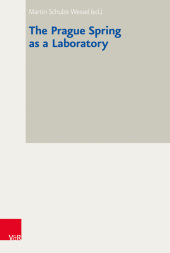 Neuerscheinungen 2019Stand: 2020-02-01 |
Schnellsuche
ISBN/Stichwort/Autor
|
Herderstraße 10
10625 Berlin
Tel.: 030 315 714 16
Fax 030 315 714 14
info@buchspektrum.de |

Vorstand des Colleg Carolinum, Martin Schulze Wessel
(Beteiligte)
The Prague Spring as a Laboratory
Herausgegeben von Carolinum, Vorstand des Collegium; Schulze Wessel, Martin
2019. 312 S. 232 mm
Verlag/Jahr: VANDENHOECK & RUPRECHT 2019
ISBN: 3-525-35598-X (352535598X)
Neue ISBN: 978-3-525-35598-5 (9783525355985)
Preis und Lieferzeit: Bitte klicken
The reform efforts in the Czechoslovakia in 1968 and the different influencing groups and individuals
Retrospectively, the Prague Spring appears to have been a coherent but unsuccessful experiment in finding a synthesis of Western democracy and socialism. However, this perspective ignores that different groups and individuals participated in these developments and shaped the Prague Spring in Czechoslovakia with their completely varying professional, generational, national, and gender-specific experiences. What appears retrospectively as a goal-oriented reform movement or as an "interrupted revolution" looked in the eyes of the protagonists rather like the situation in a laboratory, where they worked on new syntheses with uncertain results. The volume focuses on the protagonists´ ideas of politics, society, and their reform plans. Of particular interest is the question which new thoughts about the interrelation of politics, science, economics, and arts were developed in Czechoslovakia.
Schulze Wessel, Martin
Martin Schulze Wessel, Jahrgang 1962, hat seit 2003 den Lehrstuhl für die Geschichte Ost- und Südosteuropas an der LMU München inne und ist Leiter des Collegium Carolinum, Forschungsinstitut für die Geschichte Tschechiens und der Slowakei, in München.Er studierte Neuere und Osteuropäische Geschichte und Slavistik in München, Moskau und Berlin. Er wurde an der Freien Universität Berlin mit einer Doktorarbeit über "Russlands Blick auf Preußen (1697-1947)" promoviert und habilitierte sich an der Martin-Luther-Universität Halle-Wittenberg mit einer vergleichenden religionshistorischen Studie zur Gemeindegeistlichkeit in Russland und den böhmischen Länder bzw. der Tschechoslowakei (1848-1922). Er ist Mitglied der Bayerischen Akademie der Wissenschaften und Leiter des Historischen Kollegs München.


